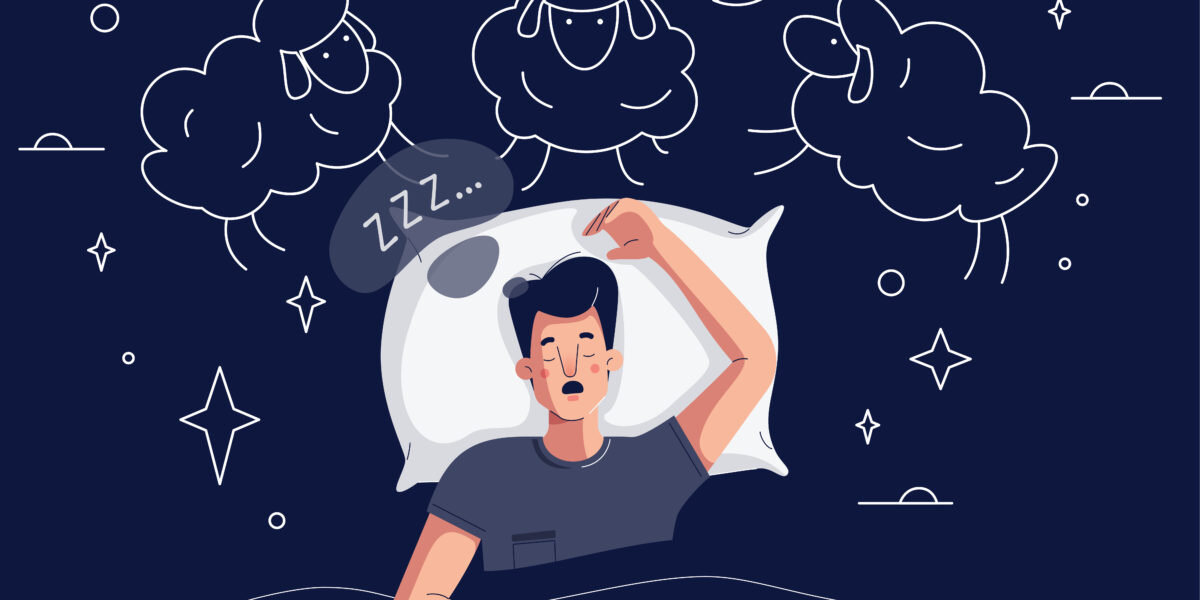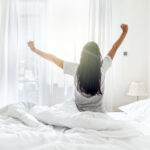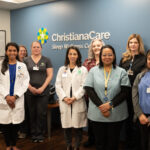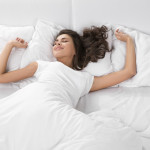The children’s nursery rhyme sings to us, “It’s raining, it’s pouring, the old man’s snoring …” But if you’ve had a sleepless night, you know what it’s like to be jealous of that snoring man who is sound asleep in his bed. At ChristianaCare, we want you to feel well-rested and refreshed after a good night’s sleep. That’s why we’re sharing five common sleep aid myths and facts with you, so you can catch your Zzz’s and get the best quality sleep, too.
Trouble sleeping? Contact our providers at the ChristianaCare Sleep Center to get a good night’s rest.
Myth 1: Melatonin is a sedative.
Fact: No, melatonin is not a sedative. Melatonin is a naturally produced hormone made by a small gland in the brain called the pineal gland. It helps to control your sleep and wake cycles. Small amounts of it are in foods such as meats, grains, fruits and veggies, and it is also available as a supplement.
Side effects of melatonin can include:
- Sleepiness.
- Headache.
- Dizziness.
- Nausea.
In most cases, it’s generally safe to take in low doses, but everyone should talk with their provider before taking melatonin, especially regarding use by children and pregnant or nursing women. Because melatonin can make you sleepy, do not drive or use machinery when taking it.
Additionally, there are other sleep supplements available. Speak with your provider to learn more.
Myth 2: The only way to treat sleep apnea is with a CPAP machine and a mask I have to sleep with at night.
Fact: There are many ways to treat sleep apnea. A CPAP machine with a sleeping mask is not the only way to treat sleep apnea. The CPAP is still the first therapy option, but it is not the only one.
Other ways to treat sleep apnea include:
- Losing a healthy amount of weight.
- Wearing an oral device for sleep apnea that is custom-made for a patient by a dentist and known as a mandibular advancement device.
- Using positional therapy pillows. These are pillows that help you sleep in a position that promotes a more open airway while sleeping.
- Using upper airway stimulation therapy.
Upper airway stimulation therapy is an implantable treatment option for people with obstructive sleep apnea who did not tolerate CPAP therapy. While you’re asleep, the implantable device gives mild stimulation to the nerve that controls the movement of your tongue and other airway muscles, keeping the airway open during sleep. Learn more about Upper Airway Stimulation Therapy here. Talk with your provider to see if this may be a good choice for you.
Myth 3: Having a “nightcap” before bed will help you sleep better.
Fact: Alcohol is a sedative that can cause a feeling of relaxation and help you fall asleep quickly. However, it is proven to break your sleep cycles and cause waking throughout the night. Alcohol can also worsen the symptoms of sleep apnea.
This can lead to:
- Daytime sleepiness.
- Building a tolerance to alcohol. This means someone must drink more each night to feel the sedation effects.
- A tough time waking up in the morning which can lead to ingesting stimulants (like coffee and soda) well into the afternoon. This can make it harder to fall asleep again at night.
If you’re worried about your alcohol use, talk with your provider. You may need to work together on a plan to try an alcohol-free reset period or “alcohol holiday.” This plan involves more than stopping cold turkey. Talk with your provider before changing your daily routine.
Myth 4: Your body will get used to getting less sleep over time.
Fact: No, it won’t! Forcing your body into sleep deprivation doesn’t automatically make it accept its new wake/sleep routine. Most people need between seven to nine hours of sleep each night for good health. The loss of sleep has short-term and long-term effects, showing that our brain and body can’t get used to less sleep because we want it to.
Not getting enough sleep can lead to:
- Irritable mood.
- Poor decision-making during the day.
- Issues with interpersonal relationships and how you interact with others.
- High blood pressure.
- Heart disease.
- Diabetes.
- Weight gain.
When you get a full night’s sleep, your body will have positive results including:
- Recovering from lack of sleep.
- Repair work, which is needed to keep you healthy and strong.
- Less pain.
- Happier and healthier moods and behaviors.
Myth 5: It doesn’t matter what time of the day you sleep as long as you get some sleep.
Fact: Our bodies are built with an inner biological clock, or circadian rhythm, which signals our brain to get some rest after the sun goes down. We are built to sleep in the dark. Some of us don’t have the choice to sleep eight hours at night, like shift workers. It’s important to know that getting six to seven hours of sleep during the day is not the same quality as the natural sleep cycle. If you’re already struggling with shift work or need to sleep during the day, there are options to protect your body with continuous hours of sleep including:
- Design the best sleep environment – make it dark, quiet, and cool.
- Associate your bed with sleep – not working on a laptop, playing on the phone, or anything irrelevant to a healthy sleep schedule. Break the link of lying awake in bed.
- Set a schedule that includes no contact from the outside world. Set your phone to do-not-disturb when you plan to sleep and silence your notifications. Set boundaries with your family and friends to help them see that you need your continuous hours of sleep to help you stay healthy.
- If you are working a night shift job and feel you’re having symptoms from nighttime work, it may be time to think about work schedule changes. Talk with your family and your employer to see if any changes can be made.
Did you know?
The ChristianaCare Sleep Center offers cognitive behavioral therapy designed to treat insomnia. We have providers and technology that can help treat you with non-medical options and approaches with evidence-based, effective methods. Talk to your provider or connect with us at the ChristianaCare Sleep Center to learn more.
Don’t push your sleep health to the bottom of the list. Make sleep your top priority for the love of your health!




